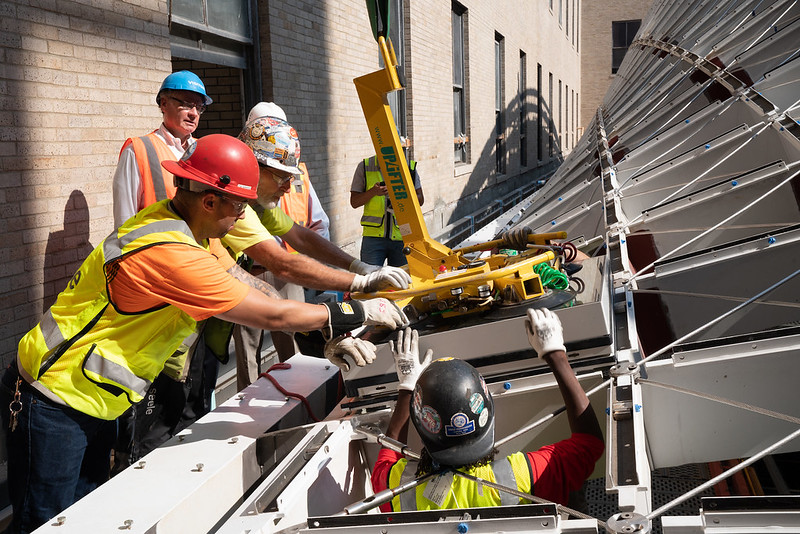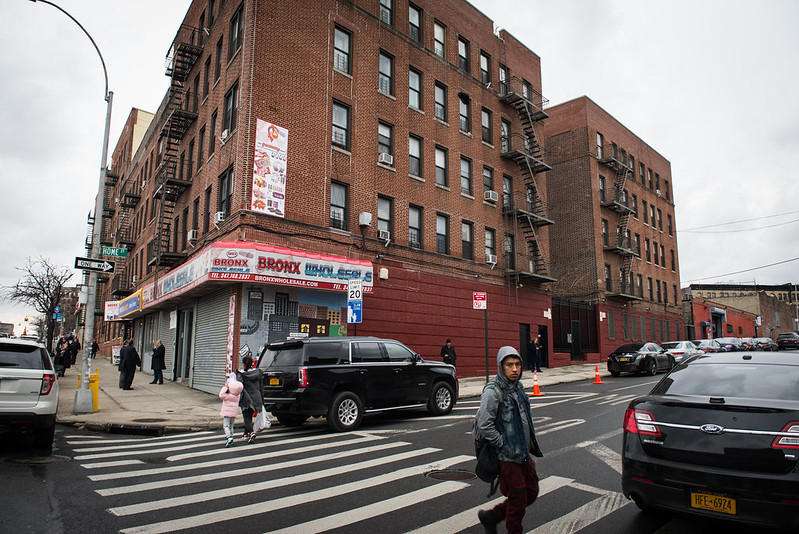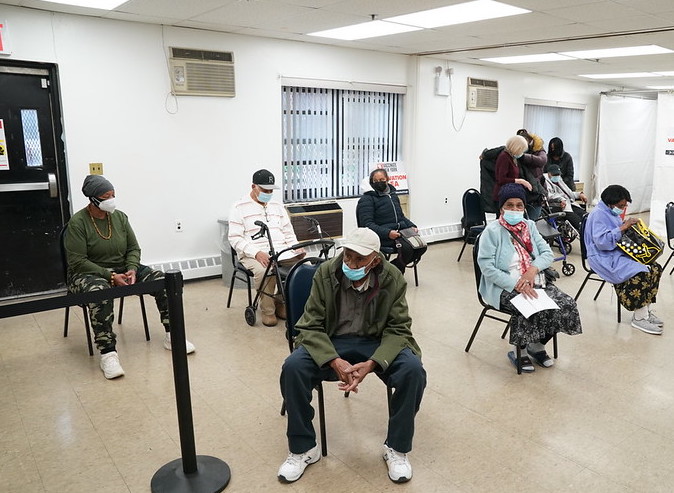The Next Big Step in Stopping Wage Theft in the Construction Industry

Construction workers (photo: governor's office)
I’m an employment attorney at Make the Road New York, a community-based organization that helps low-wage and immigrant workers fight workplace abuses. Among the hundreds of low-wage workers our team serves each year, construction workers make up the single largest group. We hear daily from construction workers cheated of their wages by subcontractors who refuse to pay overtime or disappear when a project is winding down, a problem that’s especially prevalent on the non-union and residential sites where many immigrant workers are employed, and frustratingly hard to combat under our current labor laws.
That’s why we urge Governor Cuomo to sign legislation that recently passed the State Legislature (A3350/S2766) that would help construction workers and countless other workers protect their rights and fight the pervasive pay abuses that plague New York’s construction industry.
What we’ve heard from our clients is, unfortunately, completely in-line with research on the prevalence of wage theft in low-wage jobs. A landmark study of wage theft in the U.S. found high violation rates among workers in the construction industry. Of the surveyed workers, 10.5% suffered a minimum wage violation. These rates were even higher in the residential construction industry, in which many of our members are employed: the residential sector, 12.7% of workers suffered a minimum wage violation in their previous week of work; 70.5% of workers who worked over 40 hours were denied the required overtime pay; 72.2% were not paid for “off-the-clock work” performed before and/or after their regularly scheduled shift; and 54.9% were denied meal breaks to which they were entitled. The study found that pay violations were even higher for workers paid in cash and paid by the day or week rather than the hour, as many of our clients are.
Compounding the high incidence of these wage violations, construction employers frequently try to escape accountability for their practices through abusive subcontracting schemes.
General contractors often contract with low-road subcontractors, retaining control over the worksite, wages, and working conditions while shifting only superficial employment duties over to their subcontractors. General contractors still call the shots and reap the benefits of the workers’ labor, but obscure their role in setting labor standards and deny legal responsibility for any violations.
Our system encourages these abuses. Subcontractors competing to win contracts engage in a race to the bottom by illegally depressing worker wages. Under the current employment law scheme, general contractors have little incentive to vet or monitor their employment practices. All too often, these subcontractors are not even legitimate businesses, but rather fly-by-night operations, labor brokers, or even just a worker who was told one day by their employer that they would now be responsible for handing out cash wages to their coworkers. Some subcontractors disappear overnight, leaving workers without their wages or any meaningful remedy.
Even when we are able to prove our construction worker clients’ claims, we often can’t find the employer by the time we bring the claim.
Attempting to hold a general construction contractor liable for wage violations that occur under their watch is an uphill battle under current law. In theory, we can prove that a general contractor is legally responsible even where one or more subcontractors were intermediaries. In practice, Department of Labor investigators, judges, and other decision-makers are extremely reluctant to hold general construction contractors legally liable for violations.
We need a new bright-line rule that recognizes the economic reality of subcontracting arrangements in the construction industry and gives workers a meaningful chance of recovering their wages. The bill passed by both the Assembly and Senate would do just that.
By making general contractors liable for any wage theft civil violations committed by any subcontractor on their job sites, the proposed law would give workers a much greater chance of recovering stolen wages, while also removing incentives for general contractors to use these abusive subcontracting schemes in the first place.
This reform is especially critical for low-wage immigrant workers employed on smaller projects with lower unionization rates. They are much less likely to have the resources to fight the abuses, and the most in need of this crucial law. It’s time to close this loophole and protect these vulnerable workers. The governor should sign this legislation into law today.
***
Sarah Leberstein is the Supervising Workplace Justice Attorney at Make the Road New York. On Twitter: @MakeTheRoadNY.
***
Have an op-ed idea or submission for Gotham Gazette? Email This email address is being protected from spambots. You need JavaScript enabled to view it.
Housing for Everyone Makes Everyone Safer: The City Council Must Ensure a Fair Chance for Housing for All

Housing in the Bronx (photo: Edwin J. Torres/Mayor's Office)
In response to George Floyd’s killing and demands to reimagine community safety, Governor Cuomo ordered all local governments to create plans to reform and reinvent their police forces. In response, the New York City Council adopted a “Police Reform and Reinvention Collaborative Plan.” The plan lays out concrete ways that the city can stop the cycle of poverty and incarceration -- and ways to create safety without relying solely on police.
A key part of the city’s plan: passing legislation to prohibit housing discrimination based on arrest or conviction record.
This shows that the City Council has a strong understanding of the connection between homelessness and public safety. This connection is one that survivors of violence know all too well. And yet, with the rise in the ease of online background checks, more and more people are excluded from housing because of their record. This exclusion -- masked as protecting public “safety” -- actually makes people less safe; there is no world in which making people homeless makes any of us safer.
Many may ask: but what about people convicted of violent crimes? To answer this, we have to understand that violence is more than an isolated act between two or more people. Violence is systemic and it is structural. The structural violence of racism, the violence of hunger, and the violence of poverty drive more violence. And categorically denying a group of people a basic need like housing drives violence.
Survivors want to know that they will not be victims again, and that others will not be harmed the way they were. According to a survey by the Alliance for Safety and Justice, survivors prefer the government spend more money on prevention over policing and prison. And one of the best ways to prevent people from causing harm is through preventative methods -- like quality, affordable housing.
As a survivor, Brooklyn State Senator Julia Salazar tweeted her support for eliminating obstacles to housing for people with conviction records, saying “I’ve survived sexual assault...The man who assaulted me (and others) was hardly held accountable, years afterward...And still: What good would it do to make him homeless?”
The Fair Chance for Housing campaign -- a coalition of advocates, legal services professionals, human service providers, and people who have experienced housing discrimination -- is calling on the New York City Council to put its action where its words are. There is already pending legislation -- Intro. 2047, sponsored by Council Member Stephen Levin and 23 co-sponsors -- that would immediately bar housing discrimination against people with convictions. So why wait?
The structural inequities that led to widespread protests in the wake of George Floyd’s murder have not gone away. Black and Latino people are more likely to be swept up in the criminal justice system and are more likely to face homelessness.
Making people homeless as a result of a conviction does not make anyone safer. In fact, it perpetuates the structural causes of violence.
Safety is built in community, accountability, and repair. Safety is built in the security that housing provides. It is a fundamental and basic economic need -- it can’t possibly be ignored if we hope to create a society in which survivors' needs are met, homelessness is eradicated, people with convictions are able to rebuild their lives, and safe communities are fostered.
The New York City Council must acknowledge the ways in which it continues to perpetuate harm and do better. Passing Intro. 2047 is one way to start.
***
Aliya Brown is the Senior Communications Manager and Kira Shepherd is the Vice President of Organizing and Policy at Common Justice. Alison Wilkey is the Director of Public Policy at the John Jay College Institute for Justice and Opportunity. On Twitter @alisonwilkey & @JusticeAndOpp & @Common_Justice & @FairHousing_NYC.
***
Have an op-ed idea or submission for Gotham Gazette? Email This email address is being protected from spambots. You need JavaScript enabled to view it.
Doctors to Mayor: Halt the Transfer of Homeless New Yorkers from Hotels to Shelters Now

New Yorkers
As most New Yorkers adjust to enjoy newly vaccinated and unmasked social lives, many of the city’s most medically vulnerable – homeless individuals who through painstaking work by many advocates were able to secure safe, secure hotel rooms for the duration of the COVID-19 pandemic – remain in unnecessary peril. At City Hall’s whim, they are being sent back en masse to congregate living facilities that, with the rise of the much more transmissible Delta variant, may become hotbeds of viral transmission even among the fully vaccinated (see the example of the Yankees pitching staff).
Knowingly forcing congregation (even if vaccinated) is not recommended for the general public and should not be applied for those seeking shelter. Health workers now call for the immediate halt of such actions happening this week, alarmed by the immediate danger this poses to individuals in the shelter system.
Ask any health-care professional across the city and you will hear that we entered the pandemic in March 2020 struggling to address an acute housing crisis. COVID-19 made things exponentially worse, and the mobilization of resources for homeless individuals by the City was slow, inadequate, and confusing, prompting concern and questions by April 2020. Eventually, by dint of forceful advocacy, vital resources – namely hotel beds – did come for many. Hotels have been used by the City throughout its history and in recent pre-pandemic times (which is to say this is not a new idea or radical strategy).
Absent from much public discussion is that these hotels will be paid for by FEMA funding through this September. Of historic note, mobilization of the hotel shelter system at the start of the pandemic was slow, and grassroots organizations were forced to step up and use donor funding to help save lives when the City lagged, through crowdfunding campaigns such as “The Homeless Can't Stay Home” and other non-profits.
The effect of these hotel placements has been profound. We heard from our patients who were newly placed how having the hotel room offered a haven from sleep-deprived nights, an ability to lay flat to sleep, a safe place to stay during the day, access to hygienic facilities, and most importantly some ease from the stress of worrying about coronavirus exposure in the alternative: a congregate shelter.
Throughout the past year-and-a-half, we and other health-care providers have borne witness to many slow responses that harmed our patients — from early lack of testing capacity to continued absence of transparent processes for collaborative strategic planning across public and private health-care providers — as well as policies that actively caused harm despite numerous warnings by public health officials, such as the nightly subway shutdown and frequent street sweeps (all of which were against CDC guidance and had little measurable effect on citywide COVID-19 transmission rates).
Calls to return our patients to congregate living environments must at least acknowledge the fact that there is inadequate data regarding the protection offered by partial or full vaccination rates against new variants, particularly the more transmissible Delta strain, to pass scientific judgment about whether it is safe to do so. Although a judge ruled earlier this month to temporarily halt these transfers and ensure reasonable accommodations for those living with disabilities as protected by law, transfers are now resuming again. As health-care professionals, we say that every human being needs a reasonable accommodation to safely isolate themselves and their families in the midst of what is increasingly recognized as a not-yet-finished pandemic. Shelter in the temporary form of hotel rooms has meant health, safety, peace of mind, and much-needed rest for this critical population of our patients in their most trying hour. With case rates once again rising, Mayor de Blasio’s decision to return people to congregate shelters is therefore, in our view, misguided, premature, and potentially dangerous.
And while we speak of temporary transfers to and from congregate settings, we know that the ultimate goal should be safe and affordable housing for all New Yorkers. The current acute crisis of displacement should not detract from the achievable ideal of securing more permanent housing under a new city administration.
At this historic moment, we urge the mayor to accelerate emergency implementation of the recently passed law (Intro. 146) that raises CityFHEPS voucher amounts. Once it takes effect, it will make thousands more apartments within reach to New Yorkers experiencing homelessness. Moving individuals from hotels directly into affordable permanent housing is possible even during a pandemic via several mechanisms — we have seen it happen to some of our more fortunate patients.
After the trauma of COVID-19, signs of citywide recovery have given us many reasons for hope in the face of adversity; our care and support for the historically outsized population of our fellow city residents who are experiencing homelessness could and should be one shining example of that care.
***
Nathaniel Hupert, MD MPH FACP, is a physician on the internal medicine service at Lower Manhattan Hospital and is co-director of the Cornell Institute for Disease and Disaster Preparedness. Amanda Ramsdell, MD, is an Internal Medicine Physician at New York Presbyterian in New York City and Assistant Professor of Clinical Medicine at Weill Cornell Medical College. On Twitter @ARamsdell3.
***
Have an op-ed idea or submission for Gotham Gazette? Email This email address is being protected from spambots. You need JavaScript enabled to view it.




